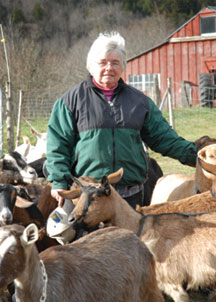A lot has changed on Christine Kaiser’s farm in the Nebraska Valley section of Stowe.
She stopped milking heifers six years ago. Her sons Clyde and Adam went into the automotive restoration business and are no longer around to help with the endless chores. A recent divorce made her the only full-timer on the farm.
That might turn most people away from the business.
But most people aren’t Christine Kaiser.
Kaiser, 61, has kept plugging away, shifting the operation away from milking to a series of income-producing ventures.
She houses 13 cows in her barn for another local farmer. She milks goats— 44 of them at the moment, with 60 more in different stages of development. She raises and sells meat birds and turkeys, pigs, and the occasional lamb. She also runs a feed business out of her garage, delivering high-quality grains and feed to customers around northern Vermont.
It’s a busy life, and she wouldn’t trade it.
“It’s a good life here on the farm,” Kaiser says. “I’ve had to become very good at my time management and prioritizing; I do most everything by myself.”
Kaiser is remarkable in this way: a single woman working virtually alone in an industry where it’s hard to stay afloat even with a fleet of workers.
And in this: Her farm is a living example of how conservation can succeed. Nearly all areas of her farm reflect in some way how she treasures the environment.
“Christine is incredibly committed,” said Christina Goodwin, director of the Lamoille County Natural Resources Conservation District & Nature Center — an organization that Kaiser has chaired for the past 17 years and is retiring from at the end of the year.
“Among many other things, she is extremely concerned with water quality and erosion problems,” Goodwin said. “She’s been on board since the beginning.”
Fifteen acres of Kaiser’s farmland border Miller Brook, a clear-babbling flow that runs the length of the valley. On her land, the stream is protected by a buffer strip.
Kaiser was one of the first farmers in Lamoille County to take measures to protect riverbanks.
The buffer strip stops her field 50 feet from the edge of the brook, preventing any pollution runoff into the water.
Kaiser allowed the Youth Conservation Corps and students from Johnson State College to work with the Vermont Fish and Wildlife Department to develop a filter strip on the bank edges, planting different types of trees and grasses to prevent stream-bank erosion.
“The trees along the edge have kept the riverbank strong. It keeps it safe,” Kaiser says. “They completed the work years ago and it’s been working ever since.”
Kaiser also manages the nutrients on her farm. She tracks what nutrients arrive — the feed for her cows and goats — and tracks what comes out, making sure there is a balance between the two. Manure is collected in a large storage pit, so it’s contained in one place.
Kaiser rotates the grazing on her land. Animals are moved from one field to the next, so grasses will regrow and so limit soil erosion. She also has livestock lanes through her land, which contain animals to the same paths across the fields, again limiting erosion.
‘A leader, a voice’
Three weeks ago, the Lamoille County Natural Resources Conservation District & Nature Center honored Kaiser for her efforts at the farm.
“She’s been a leader, a voice.” Goodwin said. “She’s a very vocal proponent for conservation; she has comments and asks questions. She’s an incredibly hard worker and wants to do whatever it takes for herself or her organizations.”
Stout and sturdy, with close white hair and a warm smile, Kaiser could pass as a grandmother headed for her golden years.
But the flannel shirt, barn boots, tough-as-nails-hands and weathered face tell her real story.
She’s a farmer, through and through.
Kaiser’s parents, Clyde and Bernadine, bought the farm in 1945. They paid $600 for 100 acres of land tucked into the valley, and began a family.
Kaiser was raised in Stowe from birth, graduated in 1963 from Stowe High School, then began a 20-year career as a registered nurse.
In 1977, she inherited the farm and land from Clyde and Bernadine and in 1983 moved there with her husband to begin farming.
They raised Clyde and Adam, but both chose other professions. Eventually she and her husband divorced.
Now, it’s just Christine on the farm.
“I don’t mind it.” Kaiser said. “It’s my lifestyle out here; it’s peaceful. I have a passion for the land; I want to sustain my lifestyle and keep my property. Maybe eventually develop a partnership with Clyde.”
Clyde lives in the midwest but Kaiser thinks he might move back to Vermont, maybe even build a home on some property adjacent to her small farmhouse.
Helpful neighbors
Kaiser works alone as a farmer, but the work is not always lonely.
Neighbors frequently stop by to help, particularly the Silva family, who live just up the valley.
Tom and Laurie Silva and their kids have been helping Kaiser since they moved to the area in 2000. Tom, in particular, has made pitching in part of his life. Often, after he finishes his workday, he throws on his barn clothes and heads to the farm.
“They’ve done so much for me,” Kaiser says of the Silvas. “Even when I’m not here, they’ll come down and help with the chores.”
Kaiser has named a few young goats after Laurie and her 12-year-old daughter Anna. “Their personalities match,” she says.
“We thought it would be a really good thing for our kids to learn how to work,” Laura said. “We really enjoy it.”
To make all the ends meet, Kaiser has learned to diversify her products. Between raising and selling turkeys (she was down to just 12 after raccoons took 20 this fall), selling 100 150 meat birds (a number she wants to expand), housing the cows, selling the feed and milking the goats (more than 30,000 pounds of milk this year), she’s able to pay all the bills.
Two years ago, after selling a chunk of land off Barrows Road, Kaiser bought a brand-new tractor. The 125-horsepower, 4-by-4 tractor has changed things on the farm.
“I’m able to spread my own manure now, and pulling the cutter is a lot safer,” she said.
It’s no secret that the farm is a potential real-estate gold mine. The land is magnificent, and many people would pay an arm and leg for it.
“I’ve had people make offers,” she says. “But I tell them no way unless they want to pay well over a million.”
Eventually, Kaiser says, she’d be happiest to see her son take over the farm. And ideally, in her grand vision, she’d like the Stowe Land Trust to buy the land, ensuring its beauty would never be tarnished by development.
But that’s a long time away, and she has a lot of work to do.
“Home is where the heart is,” she says with a warm smile and a broad look over her property. “I’ve created a lifestyle here, and I’m happy.”






















(0) comments
Welcome to the discussion.
Log In
Keep it clean. Please avoid obscene, vulgar, lewd, racist or sexual language.
PLEASE TURN OFF YOUR CAPS LOCK.
Don't threaten. Threats of harming another person will not be tolerated.
Be truthful. Don't knowingly lie about anyone or anything.
Be nice. No racism, sexism or any sort of -ism that is degrading to another person.
Be proactive. Use the "Report" link on each comment to let us know of abusive posts.
Share with us. We'd love to hear eyewitness accounts, the history behind an article.